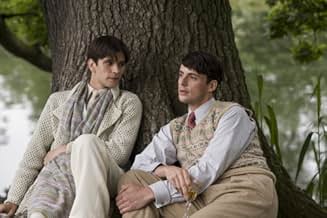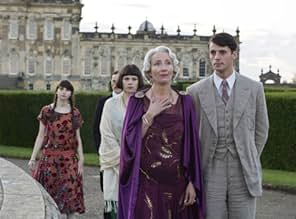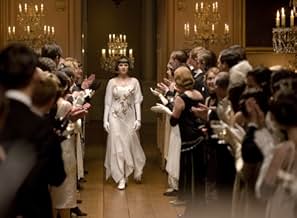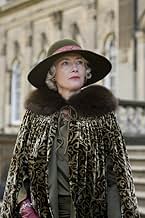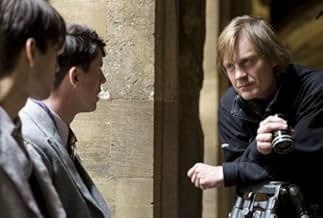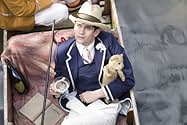NOTE IMDb
6,6/10
14 k
MA NOTE
Une histoire poignante d'amour interdit et d'une innocence perdue se déroulant en Angleterre avant la Seconde Guerre mondiale.Une histoire poignante d'amour interdit et d'une innocence perdue se déroulant en Angleterre avant la Seconde Guerre mondiale.Une histoire poignante d'amour interdit et d'une innocence perdue se déroulant en Angleterre avant la Seconde Guerre mondiale.
- Réalisation
- Scénario
- Casting principal
- Récompenses
- 11 nominations au total
Avis à la une
I haven't read Evelyn Waugh's famous 1945 novel or seen Granada's acclaimed 1981 television adaptation. so I approached the story fresh, as indeed will most viewers of this quintessentially England tale of the repressive nature of religion and class. I understand that the adaptation by Andrew Davies and Jeremy Brock has taken some liberties with the original, more subtle narrative, but this is inevitable in a work of just 133 minutes compared to the 11 episodes of the television series.
Directed by the English Julian Jarrold who made "Becoming Jane", the film has many strengths. There are wonderful locations in Oxford, Venice, Morocco and above all Castle Howard in North Yorkshire standing in - as in the television version - as the eponymous country house that is almost a character in itself. The script contains some fine lines - often very cutting and very cruel. Above all, there is some accomplished acting, both from veterans Michael Gambon and Emma Thompson as Lord and Lady Marchmain and newcomers Ben Whishaw and Hayley Attwell as their son Sebastian and daughter Julia and Matthew Goode as Charles Ryder, a young artist who falls in love in different ways with both Sebastian and Julia as well as their home and style.
Sadly, however, ultimately the whole film seems somewhat pedestrian and leaves one feeling strangely cold and disconnected.
Directed by the English Julian Jarrold who made "Becoming Jane", the film has many strengths. There are wonderful locations in Oxford, Venice, Morocco and above all Castle Howard in North Yorkshire standing in - as in the television version - as the eponymous country house that is almost a character in itself. The script contains some fine lines - often very cutting and very cruel. Above all, there is some accomplished acting, both from veterans Michael Gambon and Emma Thompson as Lord and Lady Marchmain and newcomers Ben Whishaw and Hayley Attwell as their son Sebastian and daughter Julia and Matthew Goode as Charles Ryder, a young artist who falls in love in different ways with both Sebastian and Julia as well as their home and style.
Sadly, however, ultimately the whole film seems somewhat pedestrian and leaves one feeling strangely cold and disconnected.
Among many of the most prestigious literature selections, not to mention mini-series, Brideshead Revisited not only wasn't on my radar, I didn't even know if it would be the kind of well-regarded literature or mini-series I intended to watch. But as this newly revised picture, now a mere 136 minutes vs 10 hours, it looked interesting if only as a kind of "handsomely made" picture (you know the kind, along the lines of Atonement for recent comparison). I was also intrigued by the allure of a huge, sprawling mansion here called Brideshead, as it reminded me of Alain Resnais's film Last Year at Marienbad and how memories and recollections and lost love and hope is explored in the spaces of this dark, cold region of exquisite luxury. Some of that is explored in this film, and some of it... isn't.
It's for the most part a fairly tragic story of a young man, Charles (Matthew Goode, charming and suave but also subtle and down-beat, a really fine turn), who enrolls at Oxford and meets a meek/'fey' guy named Sebastian, and through him he's introduced (reluctantly in point of fact) to Sebastian's family, including his sister Julia, and his very cold and strident mother (Emma Thompson). Sebastian really wants Charles all for himself - it's a friendship that goes just a nose-hair's length into admitting homosexuality but never really goes that far despite all appearances to the contrary - but he becomes apart of the fold, and as well falling deeply in love with Julia against 'other' wishes (mostly the matriarch's over Charles's religion).
There's a lot of the fragility of the bourgeois on display here, the arrogance and detachment that's shown very closely by the director for maximum effect. Unlike a Resnais he's not about to get too experimental with the camera; he's a careful craftsman more often than not, allowing for just enough wonderment of the whole Brideshead atmosphere to really sink into how it could be a double-edged sword of perception. And as is bound to happen with material this sprawling (at one point time jumps back 10 years, then ahead 4 years, until we kind of know where we are), a lot seems to be cut out. While it altogether makes a coherent and entertaining enough picture, I wonder how much more of a benefit this would make as an epic, where we are absorbed more fully with the Oxford school or Charles and Sebastian or even the parents (who, thankfully, are played wonderfully here by cold-as-ice Thompson and fascinatingly guilt-ridden and subtle Michael Gambon), or how the wealth structure even works here.
Indeed, I found myself not so much involved with the Charles/Sebastian stuff, even as it's fairly well-acted and well-shot enough, as I was with the themes of religion raised in the picture. This caught me off guard and hinted at something deeper being expounded upon. Yet, again, we get just tastes of what's offered more than likely in the original text, tastes that are powerful like a 'last-rites' argument, and the tortured state of being raised from the cradle with an intense, overbearing Catholic conscience.
It's for the most part a fairly tragic story of a young man, Charles (Matthew Goode, charming and suave but also subtle and down-beat, a really fine turn), who enrolls at Oxford and meets a meek/'fey' guy named Sebastian, and through him he's introduced (reluctantly in point of fact) to Sebastian's family, including his sister Julia, and his very cold and strident mother (Emma Thompson). Sebastian really wants Charles all for himself - it's a friendship that goes just a nose-hair's length into admitting homosexuality but never really goes that far despite all appearances to the contrary - but he becomes apart of the fold, and as well falling deeply in love with Julia against 'other' wishes (mostly the matriarch's over Charles's religion).
There's a lot of the fragility of the bourgeois on display here, the arrogance and detachment that's shown very closely by the director for maximum effect. Unlike a Resnais he's not about to get too experimental with the camera; he's a careful craftsman more often than not, allowing for just enough wonderment of the whole Brideshead atmosphere to really sink into how it could be a double-edged sword of perception. And as is bound to happen with material this sprawling (at one point time jumps back 10 years, then ahead 4 years, until we kind of know where we are), a lot seems to be cut out. While it altogether makes a coherent and entertaining enough picture, I wonder how much more of a benefit this would make as an epic, where we are absorbed more fully with the Oxford school or Charles and Sebastian or even the parents (who, thankfully, are played wonderfully here by cold-as-ice Thompson and fascinatingly guilt-ridden and subtle Michael Gambon), or how the wealth structure even works here.
Indeed, I found myself not so much involved with the Charles/Sebastian stuff, even as it's fairly well-acted and well-shot enough, as I was with the themes of religion raised in the picture. This caught me off guard and hinted at something deeper being expounded upon. Yet, again, we get just tastes of what's offered more than likely in the original text, tastes that are powerful like a 'last-rites' argument, and the tortured state of being raised from the cradle with an intense, overbearing Catholic conscience.
I have never read the book or seen the miniseries, so my experience wasn't clouded by already existing expectations and assumptions of the characters. Instead I was awaiting a first, and therefore unbiased look into the world of Brideshead.
As a film, it is okay bordering on good and solid. The performances are strong enough to keep the audience interested, but they do not keep us enthralled. The leads are savvy and sexy in their own rights, but they lack true appeal as performers. They can come off as rather dull in certain scenes, but in others they pull out a subtle presence that is called for in intimate, or more emotion scenes. This inconsistence was bothersome and hindered the overall telling of the story. The one presence that is felt, but is far too short is that of Emma Thompson. As the matriarchal head of the family, she is brutal and works well with the one dimensional writing she was given. If they had focused more on her, we would have been able to understand the tortured minds of Julia and Sebastian better. Instead they have Julia and Sebastian describe her to the audience, which keeps us from getting close enough to realize what deformed her mind to begin with.
Charles is, at times to weak and unsure to be accepted as someone we want to see happy. We end up being unsure of his character's intention, and not in a mysterious, purposeful way, but in a, "the film-making is too unclear" way. Is Charles just a social climber whose dreams are dashed by his wants and Atheist ways? Or is he a moral soul lost in the pull of Brideshead's condemning Catholic trappings? This is the major flaw to the film, Charles is never exposed.
Small framing problems and out-of-style shots hampered the visual appeal, but with that aside, the visuals are very lush and the score complements some well placed montages to give the viewer a true sense of the desired never-ending summer Charles and Sebastian so desperately dream after.
If you like British tales of class and religion, or period films, this one is not a letdown. It is nothing new, but nothing terrible either. I recommend it if this is your sort of thing, I was not disappointed, but I wasn't blown away.
As a film, it is okay bordering on good and solid. The performances are strong enough to keep the audience interested, but they do not keep us enthralled. The leads are savvy and sexy in their own rights, but they lack true appeal as performers. They can come off as rather dull in certain scenes, but in others they pull out a subtle presence that is called for in intimate, or more emotion scenes. This inconsistence was bothersome and hindered the overall telling of the story. The one presence that is felt, but is far too short is that of Emma Thompson. As the matriarchal head of the family, she is brutal and works well with the one dimensional writing she was given. If they had focused more on her, we would have been able to understand the tortured minds of Julia and Sebastian better. Instead they have Julia and Sebastian describe her to the audience, which keeps us from getting close enough to realize what deformed her mind to begin with.
Charles is, at times to weak and unsure to be accepted as someone we want to see happy. We end up being unsure of his character's intention, and not in a mysterious, purposeful way, but in a, "the film-making is too unclear" way. Is Charles just a social climber whose dreams are dashed by his wants and Atheist ways? Or is he a moral soul lost in the pull of Brideshead's condemning Catholic trappings? This is the major flaw to the film, Charles is never exposed.
Small framing problems and out-of-style shots hampered the visual appeal, but with that aside, the visuals are very lush and the score complements some well placed montages to give the viewer a true sense of the desired never-ending summer Charles and Sebastian so desperately dream after.
If you like British tales of class and religion, or period films, this one is not a letdown. It is nothing new, but nothing terrible either. I recommend it if this is your sort of thing, I was not disappointed, but I wasn't blown away.
As with any film which follows a beloved mini-series it is nearly impossible to escape the shadow. When watching this film you'll find yourself constantly comparing it to the mini-series and more often than not the memory of the mini-series comes out ahead.
That being said, I still very much enjoyed the film. As with other recent English remakes (Pride & Prejudice, BBC's Sense & Sensibility) you really appreciate the beauty of modern film making. The cinematography, the score, and the ever beautiful Castle Howard, Venice, and Oxford alone are worth the watching in my opinion. There are also some great performances. Matthew Goode's Charles rivals that of Jeremy Iron's, Hayley Atwell's Julia (in a more central role than that of the mini-series) was also quite good. I also found myself rather enjoying Charles' wife Celia (Anna Madeley) even in such a small role.
The real failure of the film seems to be the difficulty with compressing 11 hours into 2. Everything is forced to move faster and the more quite, gentle, and simple scenes are lost. What's left then is a distillation of the most dramatic moments. As a result the film loses the subtlety of the mini-series. The religious bits are played up a bit too much and makes the characters slightly unbelievable. Emma Thompson is great as always, but her character of Lady Marchmain as written is too over bearing, too controlling, too inhuman. The character of Sebastian is louder than in the mini-series and becomes jaded before you care much for him. Indeed, I didn't find myself caring particularly much for any of the characters except perhaps Charles.
Still, if you don't have 11 hours on hand to spend watching the mini-series, this is a suitable substitute and is worth watching at least once at any rate. As long as you don't go in expecting an equal to the mini-series you'll enjoy it and may even find a moment or two which improves upon the original.
That being said, I still very much enjoyed the film. As with other recent English remakes (Pride & Prejudice, BBC's Sense & Sensibility) you really appreciate the beauty of modern film making. The cinematography, the score, and the ever beautiful Castle Howard, Venice, and Oxford alone are worth the watching in my opinion. There are also some great performances. Matthew Goode's Charles rivals that of Jeremy Iron's, Hayley Atwell's Julia (in a more central role than that of the mini-series) was also quite good. I also found myself rather enjoying Charles' wife Celia (Anna Madeley) even in such a small role.
The real failure of the film seems to be the difficulty with compressing 11 hours into 2. Everything is forced to move faster and the more quite, gentle, and simple scenes are lost. What's left then is a distillation of the most dramatic moments. As a result the film loses the subtlety of the mini-series. The religious bits are played up a bit too much and makes the characters slightly unbelievable. Emma Thompson is great as always, but her character of Lady Marchmain as written is too over bearing, too controlling, too inhuman. The character of Sebastian is louder than in the mini-series and becomes jaded before you care much for him. Indeed, I didn't find myself caring particularly much for any of the characters except perhaps Charles.
Still, if you don't have 11 hours on hand to spend watching the mini-series, this is a suitable substitute and is worth watching at least once at any rate. As long as you don't go in expecting an equal to the mini-series you'll enjoy it and may even find a moment or two which improves upon the original.
The Granada people got it right in 1979 when they set out to film "Brideshead Revisited." They realized that Evelyn Waugh's great novel could not be done justice in a single film of two or even three hours. It had to be made into an extended mini-series. Thus, the great 11-part TV series of 1981 - the first and only great film version of Waugh's novel.
Yet, in 2008, BBC Films thought it was time for a remake. The result is this film adaptation. It lasts just over two hours. It skims over or skips characters. It changes the focus, and thus the story. It misses the essence of Waugh's story completely. So, it's more proper to call this a major revision - a revised story based on Waugh's novel.
Even Emma Thompson as Lady Marchmain and Michael Gambon as Lord Marchmain can't lift this revised story to an acceptable imitation. Apparently, because the story is so profound, BBC films chose to promote this as a remake of the TV series from Waugh' great novel. That being the case, one is led naturally to comparison. Thus, this film fails.
Still, for some fair acting by the cast, I give it five stars as though it were a different story entirely. After all, the cast can't be held accountable for the plot. Although Thompson's almost muted performance hints that she may realize she's in a far inferior work that has borrowed a great title.
Yet, in 2008, BBC Films thought it was time for a remake. The result is this film adaptation. It lasts just over two hours. It skims over or skips characters. It changes the focus, and thus the story. It misses the essence of Waugh's story completely. So, it's more proper to call this a major revision - a revised story based on Waugh's novel.
Even Emma Thompson as Lady Marchmain and Michael Gambon as Lord Marchmain can't lift this revised story to an acceptable imitation. Apparently, because the story is so profound, BBC films chose to promote this as a remake of the TV series from Waugh' great novel. That being the case, one is led naturally to comparison. Thus, this film fails.
Still, for some fair acting by the cast, I give it five stars as though it were a different story entirely. After all, the cast can't be held accountable for the plot. Although Thompson's almost muted performance hints that she may realize she's in a far inferior work that has borrowed a great title.
Le saviez-vous
- AnecdotesDame Emma Thompson threatened to quit this movie if the producers persisted in pushing actress Hayley Atwell to lose weight. Atwell said that Harvey Weinstein even insulted her over lunch by saying: "You look like a fat pig on-screen. Stop eating so much."
- GaffesAfter the dinner, at which Charles first meets Lady Marchmain, the family go to pray in the private chapel. The ladies, as Roman Catholics, would have covered their heads with a scarf or a veil.
- Citations
Sebastian Flyte: I asked too much of you. I knew it all along, really. Only God can give you that sort of love.
Meilleurs choix
Connectez-vous pour évaluer et suivre la liste de favoris afin de recevoir des recommandations personnalisées
Détails
- Date de sortie
- Pays d’origine
- Site officiel
- Langues
- Aussi connu sous le nom de
- Brideshead Revisited
- Lieux de tournage
- Sociétés de production
- Voir plus de crédits d'entreprise sur IMDbPro
Box-office
- Budget
- 20 000 000 $US (estimé)
- Montant brut aux États-Unis et au Canada
- 6 432 256 $US
- Week-end de sortie aux États-Unis et au Canada
- 339 616 $US
- 27 juil. 2008
- Montant brut mondial
- 13 451 186 $US
- Durée
- 2h 14min(134 min)
- Couleur
- Mixage
- Rapport de forme
- 2.35 : 1
Contribuer à cette page
Suggérer une modification ou ajouter du contenu manquant


